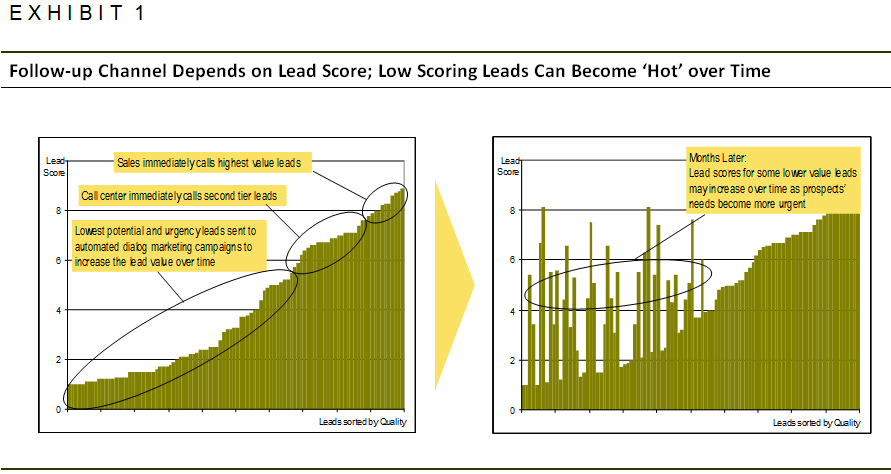Lead Management
Section 4.6 – Lead Escalation when the Process Fails
Section 4.7 – Closing the Loop and Delivering ROI
By David Bartenwerfer
The final two steps consist of the process-related issues of escalation and lead recycling, important elements of the process to ensure that all leads are accounted for and driving accountability.
By David Bartenwerfer
SECTION 4.6 – LEAD ESCALATION WHEN THE PROCESS FAILS
Regardless of score, the value of a lead decreases the longer it is neglected. When a company expends the effort to ensure leads are properly scored and sent to the appropriate channel, that channel has an obligation to act on those leads promptly in order to capture the maximum value from that lead. Lead escalation is the sixth step in the Lead Management process, and, successfully implemented, it ensures timely lead follow-up by notifying the responsible employee and ultimately management when a lead is not acted upon in a timely manner. To manage this step, lead status should be tracked electronically and automated reminders or a notification system should be employed to reassign the lead or escalate the issue if the target response time is not met.
By David Bartenwerfer
SECTION 4.7 – CLOSING THE LOOP AND DELIVERING ROI
Leads that don’t score well, particularly for urgency, should not be ignored or forgotten — they should be nurtured in order to further maximize the value of lead generation efforts.
There are two forms of lead recycling. The first is when a lead is assigned to a particular channel and for some reason they don’t or can’t follow-up in a timely fashion. The established lead escalation procedure should identify these dropped leads for management to address or reassign as necessary. Second, there will be times when a customer is not yet ready to enter active buying discussions. At this point, the lead should be re-scored and re-assigned to a dialog marketing campaign. Without the right Lead Management process, these leads fall into a black hole where they aren’t being nurtured, and the value of that lead is lost.
Low scoring leads represent a valuable opportunity for the organization. As Exhibit 1 shows, when low value leads are recycled through low cost dialog marketing programs, over time some of those leads will radically increase in value as their needs become more urgent. Not every low value lead will eventually make a purchase, but for those that do, organizations that adopt a Lead Management strategy to cost-effectively manage low value leads and stay engaged with the leads’ evolving needs will be rewarded with future revenue opportunities.
Link to the next article in the sequence: Lead Management 5.0 – Ensuring Success

Author
David Bartenwerfer is the founder and principal of Quantum Consulting and Technology. QuantumCT helps product and marketing organizations get smarter and prove, predict and optimize impact and ROI with economic and financial modeling that employs customizable algorithms and technology leading to fast and lasting insight and action. Mr. Bartenwerfer has over twenty years’ experience in the High Tech, Internet, Telecom, Media, Financial Services and Retail industries and holds a B.S. in Systems Engineering with minors in applied mathematics and economics from the University of Virginia and an M.B.A. from the Stanford Graduate School of Business. For further information, contact the author at davidbartenwerfer@quantumct.com.